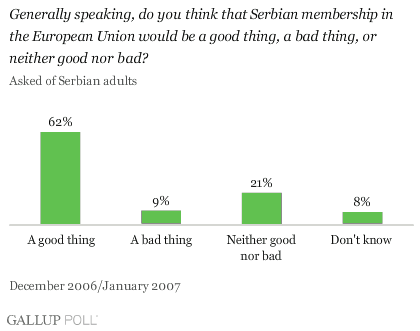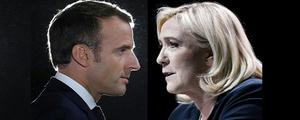WASHINGTON, D.C. -- Serbian voters head to the polls Sunday in the first round of presidential elections that many consider pivotal to whether the potential EU candidate country moves toward or away from Europe and the West. The race is tight between pro-EU incumbent President Boris Tadic and the pro-Russia ultra-nationalist Tomislav Nikolic; political observers expect a run-off election on Feb. 3. Both candidates say they reject Kosovo's recent unilateral overtures toward independence, but they differ on how European recognition of an independent Kosovo would affect Serbia's path toward EU membership.
Well before EU-Serbian relations became prime campaign trail fodder, the majority of Serbians looked favorably on the EU's role in the Balkans and saw an EU membership as a "good thing." In late 2006 and early 2007, 62% of Serbians Gallup surveyed said they thought Serbian membership in the EU would be a good thing. Just 9% felt it would be a bad thing. Sixty-three percent of Serbians said they have a positive opinion of the role the EU is playing in the Balkan region, and 48% said they approve of the EU's leadership.

Kosovo's anticipated unilateral declaration of independence in the next few months and Europe and the West's stance on the matter have appeared to overshadow other election issues. The United States and most EU member countries are likely to recognize an independent Kosovo, something Serbia has said it will never do.
Serbian election commissioners last week barred U.S. and British observers from monitoring the presidential election, reportedly because of their support for an independent Kosovo. Serbs hold neither country's leadership in high esteem: 25% said they approve of the leadership of the United States and 33% said they approve of the leadership of the United Kingdom.
But in opposing independence for Kosovo, Serbia has a key U.N. Security Council ally in its corner -- Russia. Serbs view Russia, which has historical ties with Serbia and has threatened to block a Western-backed UN Security Council plan for Kosovo's statehood, far more positively. Sixty-three percent of Serbians said they approve of Russia's leadership.
Survey Methods
Results are based on face-to-face interviews conducted in December 2006 and January 2007 with a nationally representative sample of residents aged 15 and older. For results based on the sample of 1,556 Serbs, one can say with 95% confidence that the maximum margin of sampling error is ±3 percentage points.
